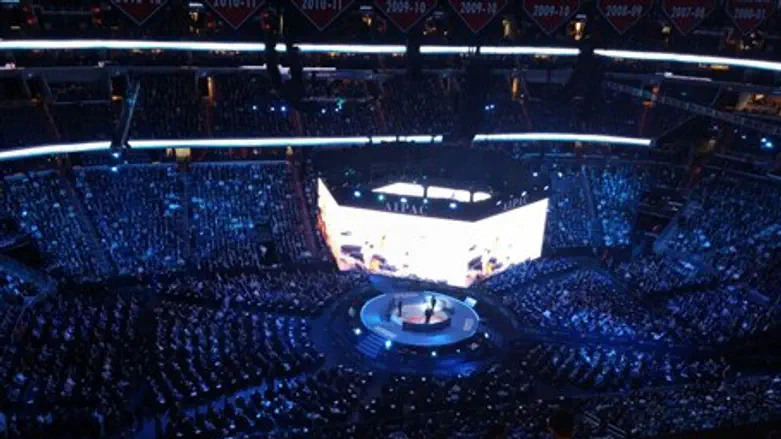
The annual AIPAC conference currently underway in Washington features, inter alia, a kit designed to help members of the U.S. Congress grasp the critical importance of U.S. defense aid to Israel.
The pamphlet begins with a letter addressed to the various members of Congress, stating that the fiscal year 2017 budget allocates $3.1 billion in security assistance for Israel, in accordance with an agreement signed in 2007. With the current agreement set to expire in 2018, AIPAC says, "negotiations are currently underway on a new agreement to help ensure Israel has the resources to defend itself—by itself."
The literature then presents the various mounting threats Israel faces, and the means it needs in order to meet them.
It should be noted that it was only after the 1967 Six Day War that the U.S. began to regularly provide security assistance to the Jewish state. A core element of American policy is to maintain Israel’s qualitative military edge (QME), i.e., the ability to counter and defeat any credible conventional military threat while sustaining minimal damages and casualties. In 2008, Congress wrote this element into law, requiring the president to continually assess whether Israel’s QME is being maintained.
In 1998, the U.S. and Israel signed their first 10-year “Memorandum of Agreement on Security Cooperation” to increase security assistance to Israel while phasing out economic aid. Under the agreement, the U.S. committed to providing Israel $21.3 billion in security assistance over the ensuing decade. This memorandum was replaced in 2007 by a new ten-year agreement calling for $30 billion in American defense aid for the decade. It is the renewal of this agreement that is now being negotiated.
The pamphlet also lays out what's in it for the United States. It explains that Israel is the one stable democratic country in the increasingly uncertain Middle East on which America can consistently depend. The two nations cooperate in intelligence, homeland security, missile defense, counterterrorism, and more.
In addition, 75% of the security aid to Israel must be spent in the United States, thus supporting American jobs and boosting the U.S. defense industry.
The list of threats Israel faces is headed by Iran, which AIPAC calls the "most significant threat to Israel's survival." AIPAC also lists Hezbollah in Lebanon (150,000 rockets and missiles), increased ISIS capabilities in the Sinai Peninsula, Hamas tunnels and rockets in Gaza, an Iraq largely under Iranian and ISIS control, and instability of various types in Syria, Saudi Arabia, Egypt and Jordan.
Incitement and encouragement of terrorism in the Fatah-run Palestinian Authority is not listed as one of the region's "mounting threats" to Israel.
It should be noted that Israel must spend a greater percentage of its GDP on defense than any other nation in the industrialized world.
What Israel needs specifically is the following, according to the AIPAC summary: Improved rocket and missile defenses, enhanced aircraft numbers and capabilities, better-protected armed forces against improved anti-tank weapons, tunnel-detecting technologies, enhanced protection and cooperation in cyber-warfare, and stronger maritime defenses.
The entire pamphlet can be read here: http://www.aipac.org/~/media/Publications/Comms/SupportingOurAlly.pdf

